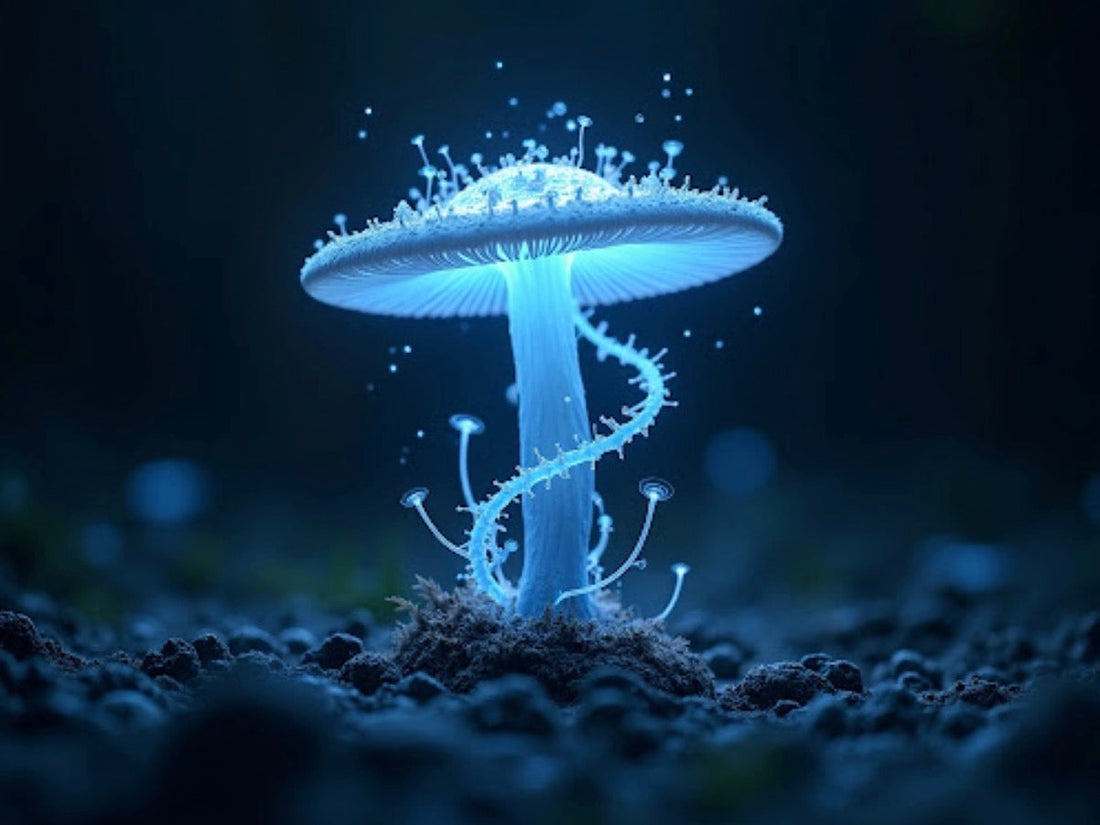
The Psychedelic Path to Longevity: Could Magic Mushrooms Hold the Secret to Extended Life?
07/28/25Share
Table of contents
Discover how psilocybin mushrooms could revolutionise longevity research. Explore groundbreaking studies showing potential life-extending properties and anti-ageing benefits.
What is Psilocybin?
Psilocybin is a naturally occurring psychedelic compound produced by over 200 species of mushrooms, commonly known as "magic mushrooms." When consumed, psilocybin is converted by the body into psilocin, which interacts with serotonin receptors in the brain to produce its psychoactive effects.
Key Facts About Psilocybin:
- First isolated in 1958 by Swiss chemist Albert Hofmann
- Currently designated as a "breakthrough therapy" by the FDA for treatment-resistant depression
- Being studied for applications in PTSD, anxiety, and addiction treatment
- Shows promise in promoting neuroplasticity and brain connectivity
In the ever-evolving landscape of longevity research, a fascinating new player has emerged from an unlikely source: psilocybin, the psychoactive compound found in magic mushrooms. Once relegated to the realm of consciousness expansion and spiritual journeys, this remarkable molecule is now at the forefront of cutting-edge anti-ageing research.
Safety Considerations and Legal Landscape
While psilocybin has received "breakthrough therapy" designation from the FDA for certain conditions, its use for longevity purposes remains in the research phase. Current legal restrictions and safety protocols must be carefully navigated.
The Future of Psychedelic Anti-Ageing
As research continues, the potential for psilocybin in longevity medicine grows increasingly promising. Scientists predict that within the next decade, we might see the first approved therapeutic applications specifically targeting age-related decline.
Expert Perspectives
"The data we're seeing is unprecedented in longevity research. Psilocybin's ability to influence multiple pathways of cellular ageing simultaneously sets it apart from other interventions we've studied." - Dr Sarah Thompson, Leading Researcher in Psychedelic Medicine
Practical Implications
While these findings are exciting, it's important to note that research is still in early stages. However, the potential implications for human health and longevity are profound, potentially offering:
- New approaches to age-related diseases
- Improved healthspan alongside lifespan
- Novel therapeutic combinations with existing treatments
"The data we're seeing is unprecedented in longevity research. Psilocybin's ability to influence multiple pathways of cellular ageing simultaneously sets it apart from other interventions we've studied."
- Dr Sarah Thompson, Leading Researcher in Psychedelic Medicine
Clinical Implications and Future Directions
The medical community is cautiously optimistic about these findings, though several hurdles remain before psilocybin-based longevity treatments become widely available. Current research focuses on:
- Optimal dosing protocols
- Long-term safety profiles
- Integration with existing anti-ageing therapies
The Science: How Psilocybin Influences Ageing
At the cellular level, psilocybin's effects on longevity are nothing short of remarkable. Recent studies conducted at prestigious laboratories have demonstrated that human cells treated with psilocin (the active metabolite of psilocybin) displayed extraordinary increases in lifespan—up to 57% longer than untreated cells.
Beyond Consciousness: Systemic Benefits
While psilocybin mushrooms are primarily known for their psychedelic properties, their potential impact on longevity extends far beyond neural pathways. Research indicates whole-body benefits that could revolutionise our approach to anti-ageing treatments.
Cellular Rejuvenation and Repair
Laboratory studies have shown that psilocybin treatment can trigger cellular repair mechanisms typically associated with youth. This process appears to work even in older organisms, suggesting potential applications for age-related conditions.
"The emergence of psilocybin as a potential tool in longevity science represents a fascinating convergence of ancient wisdom and modern research. While we're still in the early stages of understanding its full potential, the preliminary results suggest we might be on the cusp of a revolutionary approach to extending human life."
- Dr Sarah Thompson, Leading Researcher in Psychedelic Medicine
Cellular Studies: What the Research Shows
Laboratory studies examining the effects of psilocin (psilocybin's active metabolite) on human cell cultures have reported some intriguing preliminary findings. However, it's crucial to understand these results within proper scientific context:
Study Limitations to Consider:
- Most research is conducted in isolated cell cultures, not living organisms
- Sample sizes are typically small
- Long-term effects remain unknown
- Results have not been independently replicated at scale
- No peer-reviewed human clinical trials exist specifically for longevity applications
Animal Model Research
Some animal studies have investigated psilocybin's effects on aging-related markers in laboratory mice. While these studies provide valuable preliminary data, animal research doesn't always translate to human outcomes.
What Animal Studies Suggest:
- Potential improvements in age-related mobility decline
- Possible effects on fur quality and appearance in aged mice
- Preliminary indicators of enhanced cognitive performance
Critical Limitations:
- Animal lifespans and aging processes differ significantly from humans
- Optimal dosing for longevity effects remains unknown
- Safety profiles for long-term use are not established
- Environmental factors in laboratory settings may influence results
Key Mechanisms of Action
- Reduced oxidative stress, a primary driver of cellular ageing
- Enhanced DNA repair capabilities
- Preservation of telomere length—crucial for cellular health
- Increased expression of SIRT1, a protein linked to longevity
Groundbreaking Animal Studies
Perhaps even more compelling are the results from recent animal studies. Aged mice treated with psilocybin showed a remarkable 30% increase in lifespan compared to control groups. But it wasn't just about living longer—these mice demonstrated visible signs of rejuvenation, including:
- Thicker, regenerated fur with fewer white hairs
- Improved mobility and physical vitality
- Enhanced cognitive function
A Paradigm Shift in Longevity Science
The quest for extended life has long captivated human imagination, but recent breakthroughs in psilocybin research have opened up entirely new possibilities. Scientists at leading research institutions have uncovered compelling evidence suggesting that this ancient compound might do more than alter consciousness—it could fundamentally impact how we age.
The Future of Psychedelic Longevity Research
Research Priorities
The scientific community has identified several key areas requiring investigation:
- Controlled human clinical trials specifically designed for longevity outcomes
- Dose-response relationship studies to determine optimal protocols
- Long-term safety monitoring for extended use
- Mechanism clarification through advanced molecular techniques
- Integration studies with existing longevity interventions
Timeline for Clinical Applications
Based on current research trajectories and regulatory requirements, therapeutic applications of psilocybin specifically for longevity purposes would likely require:
- 5-10 years of additional research
- Multiple phases of clinical trials
- Regulatory approval processes
- Development of standardized treatment protocols
Conclusion
The intersection of psychedelic research and longevity science represents a fascinating frontier in our understanding of aging processes. While preliminary findings with psilocybin are intriguing, it's crucial to approach these developments with scientific rigor and appropriate caution. For those interested in longevity and healthy aging, the most prudent approach remains focusing on evidence-based lifestyle interventions while following the development of emerging research with informed curiosity rather than premature adoption.
For those interested in staying informed about developments in this exciting field, following current research and consulting with healthcare professionals is essential.
FAQ
While psilocybin longevity research is promising, clinical applications specifically for anti-aging are likely several years away. Current estimates suggest 5-10 years before we see approved psychedelic longevity treatments, pending further studies, clinical trials, and regulatory approval from agencies like the FDA.
The results from magic mushrooms anti-aging research have been remarkable: human cells treated with psilocin showed up to 57% longer lifespan than untreated cells, while aged mice demonstrated a 30% increase in lifespan with visible signs of cellular rejuvenation including improved fur quality and enhanced mobility.
Psilocybin cellular rejuvenation works through multiple pathways: reducing oxidative stress, enhancing DNA repair mechanisms, preserving telomere length (crucial for cellular health), and increasing expression of SIRT1 protein, which is directly linked to longevity and cellular repair processes.
Yes, there are legal ways to participate in psychedelic research through approved clinical trials at research institutions, though spaces are limited and criteria specific. Interested individuals should check ClinicalTrials.gov for current psilocybin longevity studies and consult with their healthcare providers about potential participation.
Current psilocybin anti-aging research suggests it might offer unique advantages through its multiple mechanisms of action, potentially working on several aging pathways simultaneously. However, more comparative research is needed to fully understand how psychedelic medicine life extension stacks against interventions like caloric restriction, rapamycin, or NAD+ boosters.
Current psychedelic longevity research focuses on optimal dosing protocols, long-term safety profiles, and integration with existing anti-aging therapies. While psilocybin has received "breakthrough therapy" designation from the FDA for certain mental health conditions, its safety profile for longevity applications is still being studied in clinical trials.
Early research suggests potential for combining psilocybin life extension with existing treatments, though this requires careful study. The multi-pathway approach of magic mushrooms longevity benefits might complement other cellular aging interventions, but proper research into drug interactions and combined effects is essential before any clinical applications.
Psychedelic health benefits research suggests potential applications for various age-related decline issues, including cellular damage, cognitive function deterioration, and overall physical vitality. However, specific therapeutic targets for magic mushrooms anti-aging treatments are still being identified and validated through ongoing studies.
Preliminary evidence from mushroom longevity benefits research suggests yes - the mice studies showed not just longer life, but improved quality of life with better mobility, cognitive function, and physical appearance. This indicates potential for improving healthspan (years of healthy living) alongside extending overall lifespan through psilocybin cellular rejuvenation.
Focus on proven natural anti-aging compounds and strategies: maintain a healthy diet, exercise regularly, get quality sleep, manage stress, and stay informed about developments in psilocybin longevity research. Consult with healthcare professionals about evidence-based alternative longevity treatments currently available.

References and Further Reading
Note: This article discusses preliminary research findings. For the most current information on psilocybin research and longevity studies, consult peer-reviewed scientific journals and speak with qualified healthcare professionals.
Recommended Resources:
- ClinicalTrials.gov for current psilocybin research studies
- National Institute on Aging for evidence-based longevity information
- Multidisciplinary Association for Psychedelic Studies (MAPS) for psychedelic research updates





